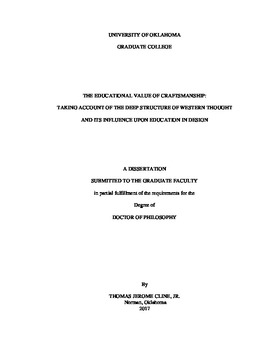| dc.description.abstract | Criticisms of design education suggest that educational practices have failed to produce competent designers and, concurrently, failed to allow for participation in culture (Norberg-Schulz 1965, Rudofsky 1987, Ponce de Leon 2010, Norman 2011). These criticisms manifest themselves in questions of design methodology and in issues of race, class, and gender equity in both educational and professional practices; however, they have not engaged design education from the standpoint of educational philosophy. This dissertation begins a philosophical inquiry of those criticisms of design education by critically constructing a history and philosophy of design and design education. This construction suggests that design is, at a very basic level, analogous to the processes and practices associated with making (Frampton 1996, Sennett 2008). Resultantly, this work explores three ways of making—artistry, workmanship, and craftsmanship (Risatti 2007)—whose beliefs and practices are beneficial in understanding how educators might think about and teach design.
This exploration of ways of making engages the work of educational philosophers as a means of coming to terms with criticisms of design education. Building from Jane Roland Martin’s project of cultural bookkeeping (Martin 2011), this dissertation theorizes a taking account of ways of making that can influence how we understand design. Taking account allows for the identification of assets and liabilities that impact design education and, once identified, can be fostered or eliminated in educational practice. Taking account requires a methodological strategy that can identify those assets and liabilities associated with education in design. As practices in education both shape and are shaped by culture (Martin 2011), this work engages critical theories that have been applied to other cultural practices. This dissertation has adapted, associated, and applied approaches by feminist scholars (Warren 1990, Korsmeyer 2004, Harding 1993, hooks 2015, Lugones 1987, Laird 2014, Code 1991). It has engaged the writings of African-American educators (Du Bois 2014, Washington 1986) and critical race theory (Anderson 1988) when exploring the educational practices that characterize African-American education in the South. The perceived liabilities of vocational education emerge from an exploration of the works of educational theorists (Dewey 1966 and 1997, Coffey 1992, Hager and Hyland 2002, Lewis 1991).
In re-conceptualizing Vitruvius’ de Architectura as a treatise concerning the educational value of craftsmanship, this dissertation theorizes that his call for utility, durability, and beauty is a statement of the necessity of the designer—the architectus—to make judgements. This ability to make judgements—judgements that require the knowledge of epistêmê and the “know-how” of technê (Aristotle 1999 and 2004, Plato 1991 and 2002)—is the most essential skill of the designer if she is to attain the height of her profession; if she is to produce useful physical artifacts that assist in mediating human relationships with and in the world. Further, making judgements can be applied to other educational practices that require creative and critical outcomes (Churchman 1967, Schön 1983, Waks 2001)—it can be applied to practices in both design and general education. The ability to make judgments and the ability to recognize and accept that knowledge is not limited to the epistemic is a result of an education in craftsmanship. The educational value of craftsmanship is an educational theory that should provoke conversations among a variety of educational agents and, resultantly, lead to new areas of exploration in design education and in more general educational practices. | en_US |
